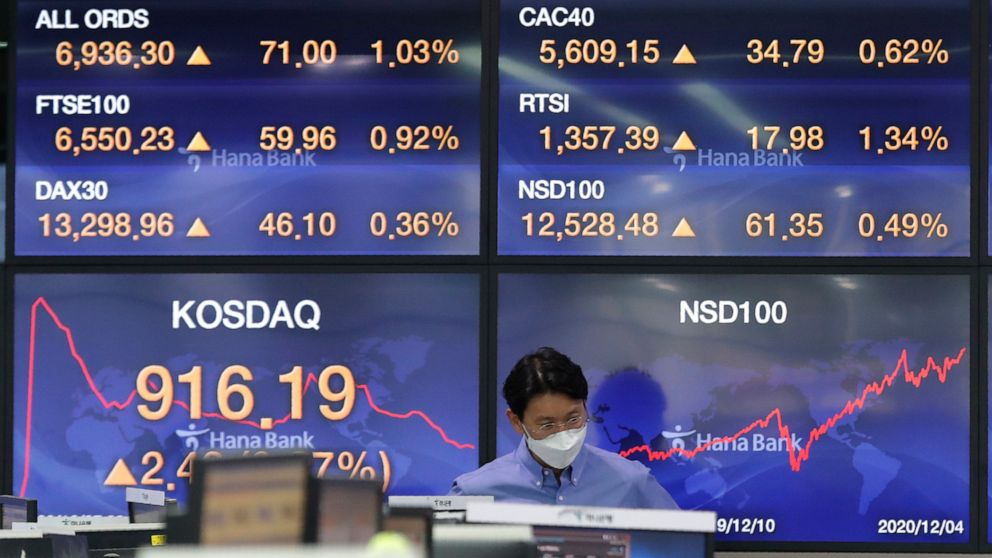Stocks close mostly lower, pushing pause on recent rally
Stocks closed mostly lower on Wall Street Monday, taking a pause from their recent rally
NEW YORK — Stocks closed mostly lower Monday as Wall Street pumped the brakes after a recent run of strong gains.
The S&P 500 fell 0.2%, as losses in health care, financial and energy companies outweighed gains in technology, communication and utilities stocks. The pickup in technology companies, whose profits have proven more resistant to the pandemic’s effect on the economy, helped nudge the Nasdaq composite to its third consecutive all-time high.
The downbeat start to the week comes as investors balance optimism that one or more coconravirus vaccines will soon be cleared for distribution in the U.S., setting the stage for an economic turnaround, against worries about more economic pain as states impose new restrictions on businesses in a bid to stem a surge in new virus cases and hospitalizations.
Traders also continue to hold out hope that Washington will deliver another round of financial aid for Americans and businesses hurt most by the pandemic. But if Congress fails to reach a deal to carry the economy through the winter, stocks could be set up for more declines.
“The market is taking a much needed pause as it waits for answers on the stimulus package,” said Quincy Krosby, chief market strategist at Prudential Financial. “Will it be closer to a trillion or closer to $500 billion? That’s going to be important for the market.”
The S&P 500 dropped 7.16 points to 3,691.96. The Dow Jones Industrial Average slid 148.47 points, or 0.5%, to 30,069.79. The Nasdaq gained 55.71 points, or 0.4%, to 12,519.95. Small company stocks slipped 1.20 points, or 0.1%, to 1,891.25.
Stocks have mounted a strong, weekslong run around the world. The S&P 500 had one of its best months in decades during November and added more to it last week, in large part because of optimism about the development of coronavirus vaccines. Hope has also built that Washington may be able to get past its partisanship to deliver some form of aid for the still-struggling economy in the meantime.
Lawmakers on Capitol Hill are trying to figure out how to deliver long-delayed pandemic relief, including additional help for businesses hard hit by the pandemic, further unemployment benefits, funding to distribute COVID-19 vaccines and funding demanded by Democrats for state and local governments.
The worsening pandemic is pushing governments around the world to bring back varying degrees restrictions on businesses, keeping customers away from businesses and threatening to drag down the economy through what’s expected to be a bleak winter. Job growth in the United States slowed sharply last month, a report on Friday showed, and the numbers may get only worse.
Uncertainty over the impact of the virus surge, the timing of a vaccine rollout and potential aid from Washington has helped slow the momentum for financial markets and made technology stocks go-to buys for traders. Apple rose 1.2%, while Facebook gained 2.1% and Netflix climbed 3.5%.
“Whenever there are concerns about growth, investors and traders migrate to the tech names,” Krosby said.
Monday’s tech rally is a flip of the market’s recent momentum and a callback to how it was trading earlier this year, before enthusiasm burst higher in November that one or more COVID-19 vaccines will get the global economy closer to normal next year.
“It gave us all some hope and hope is a pretty good ingredient for the markets,” said Frank Panayotou, managing director at UBS Private Wealth Management.
And while the markets are likely in good shape for the medium or long-term, he said, investors can expect some choppiness as the the virus’ impact continues ahead of vaccines reaching people next year.
Stocks that would benefit most from a reopening, healthier economy were taking some of the sharper losses, giving back some of their big recent gains. Energy stocks in the S&P 500 fell 2.4% after their 16.8% surge in November, for example. Bank stocks were also weaker than the rest of the market, and roughly two-thirds of the stocks in the S&P 500 fell.
Chevron Corp. fell 2.7% amid worries that the worsening pandemic could choke off more demand for oil and energy.
Other companies whose profits desperately need the economy to improve and the world to get closer to normal also fell. Mall owner Simon Property Group dropped 4.8%, Olive Garden-owner Darden Restaurants fell 2.4% and airline operator Alaska Air Group lost 3.6%.
In Europe, stock indexes closed mostly lower, and the value of the British pound fell as negotiators in the United Kingdom’s exit from the European Union seemed to remain stuck on the same issues that have prevented a deal for months.
In Asia, markets were mixed as relations between the United States and China, the world’s two largest economies, remain tense.
The yield on the 10-year Treasury fell to 0.93% from 0.96% late Friday.
———
AP Business Writer Elaine Kurtenbach contributed.
![]()


